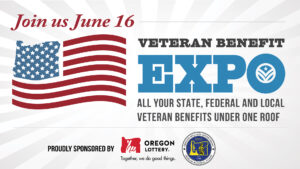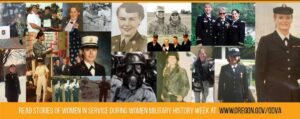![]()
2022 Women’s Military History Week in Oregon
In honor and recognition of Oregon’s Women’s Military History Week, the Oregon Department of Veterans’ Affairs is spotlighting two dozen outstanding women veterans who continue to serve their communities in various ways. Participants were asked the same questions exploring their service, backgrounds, experiences and continuing work with veterans and their families. Their answers were lightly edited to preserve their unique voices and the unified spirit of service that they share.

Branch of military?
U. S. Army
Rank?
SSG (Staff Sergeant)
Where did you serve?
Stationed at Fort Bragg (home of the Airborne). Assigned to the 4th Psychological Operations Group as part of the JFK Special Warfare Center. I deployed to Panama, Bogota-Colombia, Lima-Peru, and a short stint in Port-au-Prince, Haiti.
When did you serve?
1988-1995
What did you do in the military?
Psychological Operations, Paratrooper – yes, I jumped out of 52 perfectly good airplanes. While in the Army, I became fluent in Spanish and served my last 2 years working in the U.S. Embassy and U.S. Military Group in Bogota, Colombia. I was responsible for coordinating the public awareness campaign while fighting the drug war in Colombia. I graduated with honors from leadership development courses.
Why did you want to serve?
I grew up in a small town in Iowa and wanted to experience more than Iowa cornfields. I spoke to a recruiter while in High school and wanted to be the first in my family to serve in the military.
What does your service as a woman veteran mean to you?
I am honored to have served this country as a woman veteran, defended this nation’s freedom, and to continue to serve my fellow sister and brother veterans. As a female veteran, it is my hope I can inspire young ladies to realize their full potential and live by the motto, “yes you can” by first deciding to do something amazing then following through with it for you! Anything is possible.
What do you want other women veterans, or younger women considering entering the military to know about your service?
There were so many times where I was only one of a few female soldiers among many male soldiers in a unit, school, training, or deployment. Being outnumbered by gender did not matter. If you stay laser-focused on contributing to the military team, working just as hard or harder than everyone else, and following through on your commitments, you will reap the intrinsic benefits for a lifetime by becoming a “proud woman veteran.”
How do you continue to serve?
As the Director for the US Department of Labor – Veterans Employment and Training Service (VETS) in Oregon, I have the opportunity to continue to serve Oregon Veterans and their families by providing employment and training grants to organizations and agencies, who in turn assist veterans transitioning from military to civilian life reach career goals. Promoting partnerships in Oregon among agencies, employers, and other entities who focus on veterans is extremely fulfilling so that the common goal of enabling veterans to reach their full career potential can be accomplished. I also serve as a mentor to upcoming women leaders in federal service.
What do you want veterans (and their families) to know about the programs or services offered by your organization?
US DOL VETS prepares America’s veterans, transitioning service members, and spouses for meaningful careers, provide them with employment resources and expertise, protect their employment rights, and promotes their employment opportunities.
To learn more about the U.S. Department of Labor’s Veterans’ Employment & Training Service, click here.
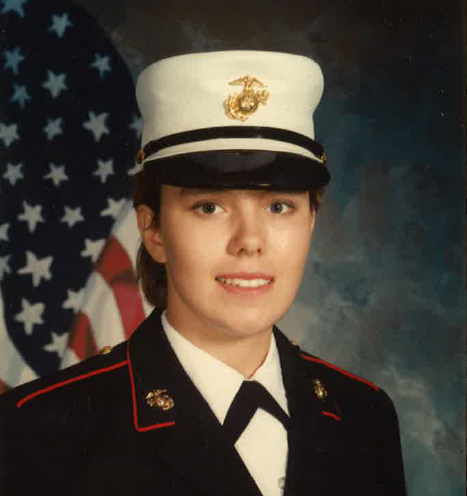
Vicki Horn
Branch of military?
U.S. Marine Corps
Rank?
Corporal/E4
Where did you serve?
North Carolina for most of it, Cherry Point. One year in Okinawa Japan
When did you serve?
1989-1994
What did you do in the military?
I was an Aviation Administrative Clerk – 6046. We tracked aircraft hours and maintenance records. I was assigned to QA for awhile and was the Technical Librarian- which means I updated manual pages when they made changes. I would get packets of pages and then go to the shop that had that manual and swap out the pages. Occasionally brown recluse spiders would come out of the manuals, so it was a dangerous assignment. I was assigned to a C-130 training squadron at Cherry Point for 3.5 years. Occasionally we were allowed to go on weekend flights that went overseas, so I got to go to Bermuda, Spain, and Germany. I also did short deployments to Yuma, Arizona and Fallon, Nevada.
Why did you want to serve?
I was attending college and unsure what I was going to do with my life and the student loans were piling up. I went into the Marine recruiters to sign up for reserve duty to make some extra money for college and he dared me to join. Crafty recruiters. On a serious note, my dad was a Marine and the importance of service, either in the military or supporting community, was a value my family embraced.
What does your service as a woman veteran mean to you?
I served during the Tailhook era. This meant lots of forced training on sexual harassment and discrimination. Many Marines already treated the female Marines as less than “real” Marines and the tension caused by the training seemed to magnify that feeling and treatment. For many years, I did not feel like a “real” veteran. I really appreciate my position as a Veteran Service Officer because it gives me a chance to talk to a lot of female veterans. We have so many similar experiences, across branches, I have found my veteran identity through my connection with them.
What do you want other women veterans, or younger women considering entering the military to know about your service?
How proud I am of what female veterans do! The stories I have heard as a VSO tell me we have a way to go for fair and equitable treatment, but their exceptional service supports the needed shifts in military culture.
How do you continue to serve?
I am a County Veteran Service Officer (VSO) and assist veterans in accessing the benefits they are entitled to receive.
What do you want veterans (and their families) to know about the programs or services offered by your organization?
Please call our office to see what benefits you may be eligible to receive. A VSO will meet with you and discuss your service and what benefits are available.
To learn more about Washingon County Veteran Services, click here.
Sheronne Blasi
Branch of military?
U.S. Navy – go Navy!!!
Rank?
E-5 enlisted, then I received a commissioning through the Enlisted Commissioning Program, and served in the Supply Corps as a Lieutenant Junior Grade (LTJG).
Where did you serve?
When I first joined the Navy, women did not go to sea, so my first duty stations were shore duty billets. I served in Groton CT, Mississippi, GA, Washington DC, Boulder CO, and Bremerton WA.
When did you serve?
1986-2000
What did you do in the military?
While enlisted I served as a Yeoman (Admin), then a student in ROTC for three years, then as a Supply Corps Officer onboard a fast-combat support ship, and finally at the supply depot.
Why did you want to serve?
I initially joined for a better life and for a college education. After getting out of the Navy after four years, I was in the Reserves for about a year, and got recalled during Desert Storm, and served another 10 years.
What does your service as a woman veteran mean to you?
I served during a very difficult time for women in the military. Women were not welcomed at sea, which made shipboard life challenging. But I feel as though I had an opportunity to show that women could serve alongside men, and do well. I’m proud to have served during a very transitional time.
What do you want other women veterans, or younger women considering entering the military to know about your service?
I would encourage young women who are considering going into the military, or men, to do their homework before signing up. Advocate for yourself before joining to be guaranteed a training program after basic training. Also sign up for education benefits, because even if you don’t plan to go to college, you might change your mind, or you can use them for apprenticeship training after you leave service.
How do you continue to serve?
I’m honored to be able to continue serving by leading programs that help ensure veterans have access to their earned benefits. And I’m proud that ODVA offers so many supports and programs to traditionally underserved veterans, including women, LGBTQ+, Tribal, Incarcerated, and Houseless veterans.
What do you want veterans (and their families) to know about the programs or services offered by your organization?
You might be surprised to learn that you have earned state and federal benefits that you’re not aware of. Such as, healthcare, behavioral healthcare, dental care, monetary compensation, educational benefits. And you may have family members who are entitled to benefits as well. There are a lot of people and organizations that are here to support you as a veteran, and they truly want to help.
To learn more about veteran benefits and resources, visit ODVA’s website here.
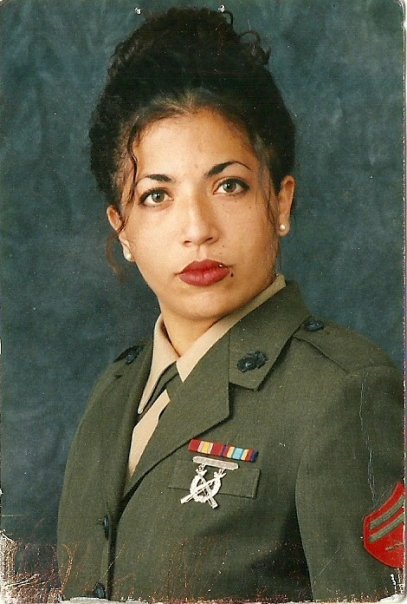
Rosy Macias
Branch of military?
U.S. Marine Corps
Rank?
Sergeant
Where did you serve?
I had two main duty stations, Iwakuni Japan and MCAS Miramar, but I did several small deployments within my unit
When did you serve?
1995-2002
What did you do in the military?
Aviation Supply, 6672
Why did you want to serve?
I joined because I didn’t know what to do with my life after high school, but I knew that staying home working retail stores wasn’t for me either.
What does your service as a woman veteran mean to you?
While I joined the Marines because I wanted to travel and get the educational benefits, I had no idea the impact that my time in service was going to leave me with. My time in service made me who I am today, it gave me the confidence, bravery, and courage to succeed in a male dominated service and that confidence and fight is still with me in everything I do today .
How do you continue to serve?
I continue to serve by working with local veteran organizations and agencies in any way I can. It brings me joy to volunteer my time to help my brothers and sisters in arms.
What do you want veterans (and their families) to know about the programs or services offered by your organization?
Vet Centers are community-based counseling centers that provide a wide range of social and psychological services, including professional readjustment counseling to eligible veterans, active duty service members, including National Guard and reserve components, and their families.
Aside from offering individual, group, marriage and family counseling, we also offer our veterans social outings such as hiking, surfing, biking and more.
The Salem Vet Center counselors and outreach staff, many of whom are Veterans themselves, are experienced and prepared to discuss the tragedies of war, loss, grief and transition after trauma.
To learn more about the Salem Vet Center, click here.

Ramona Quenelle
Branch of military?
U.S. Navy
Rank?
E-5, IT2(SW) and Top-Secret Clearance
Where did you serve?
NAVCOMDET Chinhae South Korea, COM7THFLT Staff on the USS Blue Ridge, and at NAVCOMTELSTA in Yokosuka, Japan.
When did you serve?
1999-2003
What did you do in the military?
I went through Radioman (RM) “A” School, but when I got to the fleet, we were Information Systems Technicians (IT). My rate logo is “Sparks” which I love!
Fun Fact:
I use my military affiliation and my rate logo on all of my powwow regalia. My beadwork has mini flags and my leggings have my “Sparks.” On many of my dresses, I wear bullet shell casings that family or friends have given me as another symbol of my service.
Why did you want to serve?
I served because I wanted to be awesome like the other women in my family (my mom was a firefighter and my uncles were all loggers). Culturally, our veterans are honored because they are our warriors and I always looked up to the veterans I would see in my travels to powwows. I chose the Navy because my favorite color is blue and I love water. I honestly never dreamed I would one day be a veteran too.
What does your service as a woman veteran mean to you?
When I was in, I didn’t think about my service too much because I was doing the job like everyone else who was serving. When I first got out, I used some of my education benefits to finish my education and pursue further degree goals. Other than that, I did not consider myself a veteran because I thought that designation only applied to “combat veterans.” It took many years before I even realized I am also considered a “veteran.” Now, I wear the designation proudly and I am honored to be a part of this small, unique group of folks who made the choice to serve their country.
What do you want other women veterans, or younger women considering entering the military to know about your service?
I was very lucky and had a positive military experience. I would tell anyone, especially our Native population, to consider time in the service. I come from a tiny reservation in the middle of nowhere. I know the barriers that we as Native people face and it is easy to think that there are no opportunities. In the service, you will see, do, and experience more than you ever thought possible; you will gain skills; a paycheck; and get to see the world (or, at least one of the coasts) in a way that serves you for the rest of your life. I say I was lucky because my service was positive. Some of my female veteran friends did not have that same experience, so always make sure this is the right choice for you. Before you go
in, be selective about what job you choose and ask as many questions as you need to know what to expect. Make sure you take advantage of all the offers the military can give you in writing before you sign the dotted line because you are in for the minimum amount of time your contract says you are. I will also say, while you are in, don’t get in trouble and document each and every injury that you get while in the service. Having an honorable discharge and your medical records when you get out of the service will help you when you apply for your service-connected benefits. I will tell you that being in the service is not easy. Your mental and physical strength will be tested. The distance away from family and culture is so difficult, but there are ways to keep in touch with both while serving. I will say that although four years seems like a long time to be in the service, the time passes either way. What you do in that four years can change your life whether it be serving in the military or getting your education. When you are busy, time flies!
How do you continue to serve?
The way I serve veterans now is in my position as a Tribal Veterans Service Officer (TVSO) for the Confederated Tribes of Grand Ronde. What I do as a Tribal Veterans Service Officer is connect veterans to the benefits they are eligible for. I took a really round-about path to get to where I am today. I have all kinds of experience and education in a variety of different specializations, which individually, didn’t really help me in a career. Now, all of that collective experience has helped me in this position to be able to work more effectively on behalf of veterans. It is so rewarding to work in a position that allows me to assist veterans and their families obtain tangible benefits that can help them.
What do you want veterans (and their families) to know about the programs or services offered by your organization?
The Confederated Tribes of Grand Ronde offers so much to their tribal members. The Confederated Tribes of Grand Ronde usually sponsors a Veterans Summit and a Veterans Powwow in July of each year. These events are open to all veterans. We also have a Confederated Tribes of Grand Ronde Color Guard, a Veterans Special Event Board, Veterans Royalty, and the West Valley Memorial. Hopefully soon we will be transitioning to a building that will allow us to establish a Veterans Center this year. My office specializes in assisting veterans and my primary role is to connect veterans to the benefits they may be eligible for. My primary focus is Tribal veterans, but I also work with all community veterans. Another part of what I do is outreach through community events provide training periodically on topics that are important for veterans to know.
What do you want veterans (and their families) to know?
What I would like veterans and their families to know is that they should reach out to apply for benefits, whether it be to me or any of the others Veteran Service Officers around the state. Veterans worry that they are taking away from other more “deserving” veterans. Just know that you are not taking from others because you are applying for the benefits you have earned through your service. If you don’t know where to start or feel the process is complicated (it is), this is where my position comes in. I help veterans navigate the application process and work on their behalf to get their claims filed and assist during the claims process. You won’t have to do this alone if you reach out to a Tribal or County Veterans Service Officer. It will always be no if you don’t ask, but it is possible that if you ask, you get granted benefits that can help you and your family. So reach out!
To learn more about the Confederated Tribes of Grand Ronde’s Tribal Veteran Service Office, click here.
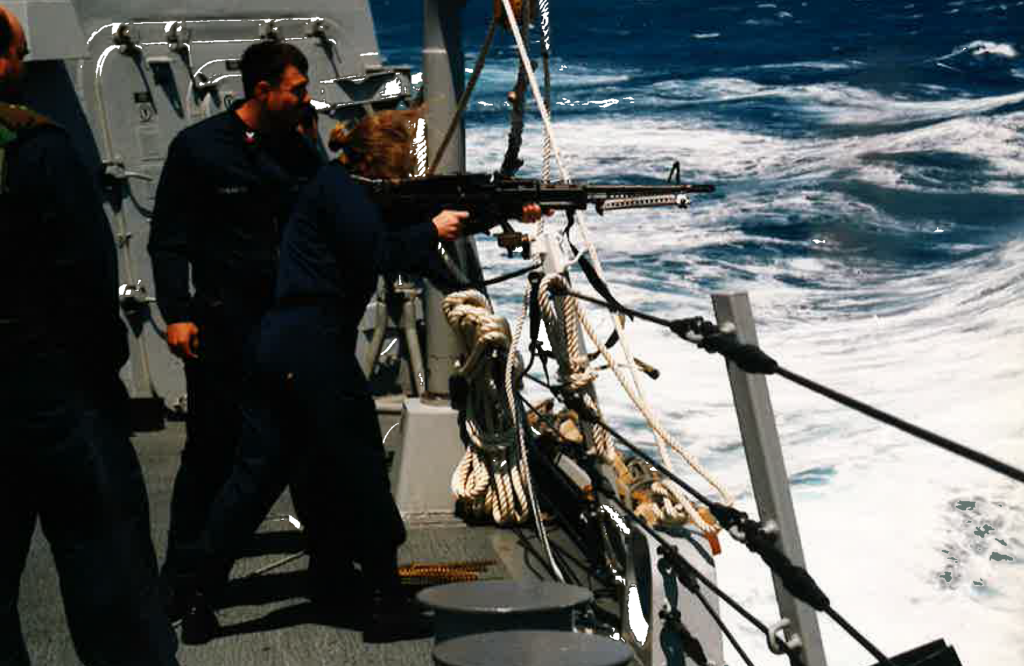
Laura Moore
Branch of military?
U.S. Navy
Rank?
E5/GM2
Where did you serve?
On board the USS Porter DDG78
When did you serve?
1997-2001
What did you do in the military?
Gunner’s mate
Why did you want to serve?
It was a way to honor my country, add adventure to my life, travel, learn new skills, and obtain a college education.
What does your service as a woman veteran mean to you?
It is really hard to put into words what my service means to me. I don’t always disclose I am a veteran – sometimes it works for me and other times against me.
It is kind of funny, a few years ago I was actually called out in a meeting as a “closet veteran” by another female veteran. For me, thinking about my service conjures up some of my greatest highs and lows in life.
I keep coming back to the “woman” that is written in this question. You know, I would like to believe that my gender does not distinguish my military service from a man’s. At the end of the day, we both served, we are all family, and we are all connected. That being said, I can’t say that my gender didn’t affect my service. There were so few women in my rate. I was the only female in my division when I got to my ship. At that time in my life, I felt that meant I had to work twice as hard, twice as long, and study twice as much – so I did – and as a result I became much stronger and more resilient.
The people I met, the places I traveled to, experiencing things like seeing dozens of dolphins chase the ship while the sun dipped down into the ocean, being rocked to sleep like a baby – they were not only life changing but soul changing. In totality, it was and remains incredibly bittersweet.
How do you continue to serve?
One of my greatest joys is helping other veterans. Whether that be filing a claim, spreading awareness about veteran issues, or getting food donations for an event I want to put on; it really warms my heart to serve those who have sacrificed so much and served.
What do you want veterans (and their families) to know about the programs or services offered by your organization?
We often find many service-connected disabled veterans are not aware of their state and federal benefits. For the tech friendly vets we have this information located online and for those that prefer paper, they can call us and request a hard copy of the benefit packet be mailed to them.
Outside the scope of screening veterans and their dependents for benefits, filing claims, and connecting people to services, we like to engage and involve our local community in recognizing veterans and shed light on veteran issues.
I try to plan events that are first of all fun and educational, but also involve and attract veterans of all different eras and their families. Nothing says get together like food. We always have a meal with our events.
Despite COVID, this year we have managed to have an outdoor Suicide Prevention and Awareness concert, Veteran Healing Memorial Dedication, Drive-thru Thanksgiving Meal, Pick up Christmas Toys and Meal, and a Valentine’s Day Brunch.
To learn more about the Jefferson County Veteran Service Office, click here. Upcoming events are available here or in the Madras Pioneer.
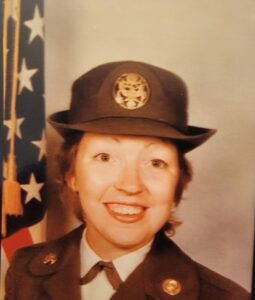
Kathleen Hoffman
Branch of military?
U.S. Army
Rank?
E-5
Where did you serve?
Ft. McClellan, AL, Ft. Eustis, VA (twice), Ft. Knox, Ky, Ft. Wainwright, AK, Fligerhorst Kaserne, Germany (Ft. McClellan, AL is a point of contention in regards to toxic exposures to AO and other PCB’s) for those who were stationed there. It has not been awarded a presumptive list like Camp Lejeune or Vietnam, however veterans have been trying to get a bill passed for years.
When did you serve?
1978-1985 (medically retired in 1988)
What did you do in the military?
68F Helicopter Electrician, 81E Illustration Artist
Why did you want to serve?
All my uncles were in Vietnam and their service spoke to my heart. My grandmother was a nurse in WWII (there was 150,000 women who served in WWII). My Grandmother and my Aunt Marilyn were the only 2 women that I knew growing up that worked other than teachers. My Grandmother Betty was a trail blazer and she encouraged me to not follow the norm.
What does your service as a woman veteran mean to you?
In 1978 my service started out in the Women’s Army Corp. On October 20, 1978 it was disbanded by President Carter. It was a changing time for women in the military. There were more jobs opening up, more promotions and more travel. Being in the Army exposed me to opportunities and experiences that I would not have had if I had not joined such as travel and working with such a diverse group of people.
What do you want other women veterans, or younger women considering entering the military to know about your service?
Be proactive in your life. Figure out as you go how to make the military work and benefit you.
How do you continue to serve?
I am very involved in PTSD due to personal trauma, regardless of gender or how they self-identify. I travel and do symposiums on the VA claim process and have recently, due to COVID, did a few events on “the end of life.” I assist with local fund raisers for our veterans or families who need assistance.
What do you want veterans (and their families) to know about the programs or services offered by your organization?
Our doors are open and we work for you.
For more information about Grant County Veteran Services, click here.

Jennifer Hahn
Branch of military?
U.S. Army
Rank?
Sergeant
Where did you serve?
Fort Jackson, Fort Gordon, Fort Bragg, Camp Red Cloud, Manheim, Germany; Kandahar, Afghanistan; Jalalabad, Iraq; Muzaffarabad, Pakistan; and Fort Carson.
When did you serve?
1997-2017
What did you do in the military?
Communications
Why did you want to serve?
Family tradition
What does your service as a woman veteran mean to you?
I didn’t think about being in the Army as a woman
How do you continue to serve?
Working at the Oregon Veterans home.
What do you want veterans (and their families) to know about the programs or services offered by your organization?
Oregon Veteran Homes is a great place to be.
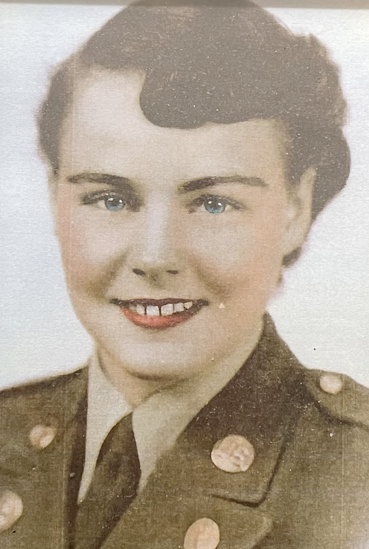
Shirley Boehmer
Branch of military?
U.S. Army
Rank?
Sergeant
Where did you serve?
Japan
When did you serve?
3.5 years, beginning after I graduated high school in 1948
What did you do in the military?
Cryptography
Why did you want to serve?
“It was something to do other than nothing. I didn’t want to go to college at the time. I wanted something exciting.”
What does your service as a woman veteran mean to you?
“I think it’s great. I got to see the world.”
What do you want other women veterans, or younger women considering entering the military to know about your service?
“Do it before going to college & travel – it’s only a couple of years.”
“Do it before settling down.”
“I want young people to get the information so they have knowledge and take advantage” of this opportunity (meaning the opportunity to get support through places like Lebanon Veteran Home).
“Let young people know about places like this before they join the service.”
“Young people should look at it all – they should visit facilities like this or have veterans talk to them.”
“High schools should know about the VA.”
How do you continue to serve?
“I would if I could.” I wish there was an outreach program at the Veteran Home
What do you want veterans (and their families) to know about the programs or services offered by your organization?
“I want them to know everything!” Also wants different branches of the military to learn more about each other.
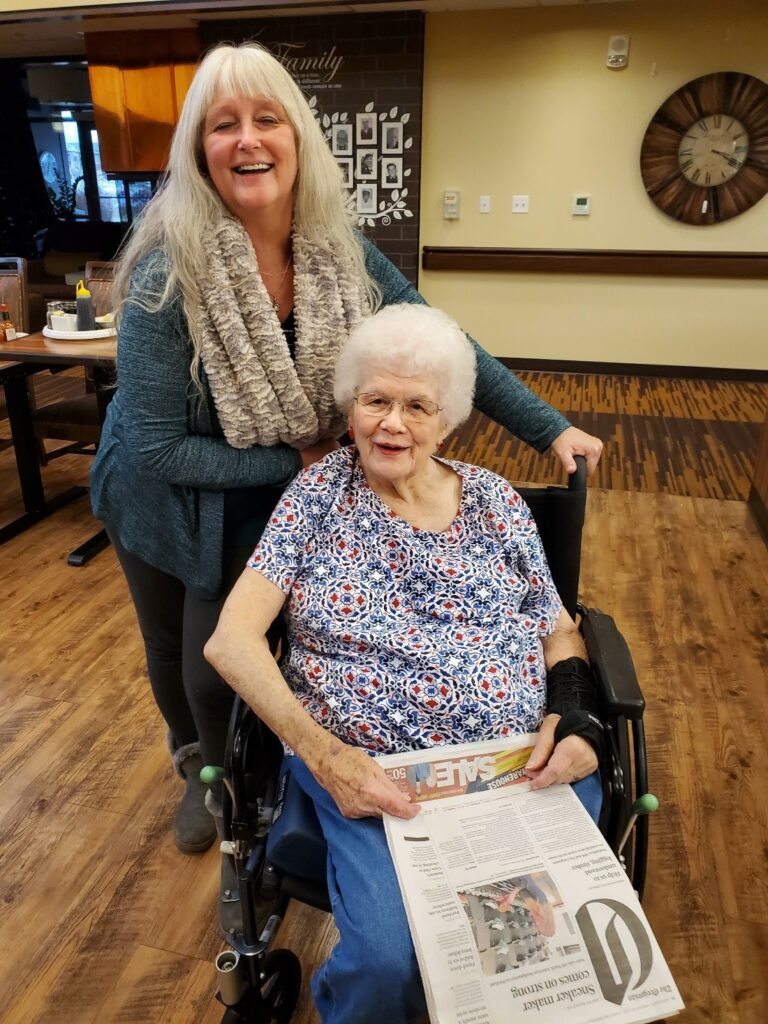
Laura (Garren) Meckle
Branch of military?
U.S. Air Force and U.S. Army
Rank?
Technical Sergeant (Air Force) and Colonel (Army)
Where did you serve?
Fairchild AFB, WA; Homestead AFB, FL; Portland Air Base, OR; Oregon National Guard; Pentagon; Germany; Singapore; Philippines; Fort Leavenworth
When did you serve?
1976-1988 (Air Force) and 1988-2011 (Army)
What did you do in the military?
I was the first Jet Engine Mechanics in the Air Force. I also served as a Flight-line mechanic and a Flight Assistant. For three years I served as a Veterinary Technician before returning to aircraft maintenance.
I worked on B52s, KC-135s, F4 Fighters, F14 and F15 Fighters. I also was a member of the Oregon Air National Guard’s first C-130 crew.
I became an officer through Oregon State University (OSU) ROTC program and joined the Army as a Cadet. Once commissioned I was a Maintenance Officer, an Armor Officer, a Fuels Officer, and an Administration Officer.
I was the first female Company Commander in an Infantry Battalion (1/186 IN) and had the first all-female command team in the unit.
I commanded the 41 Personnel Services Company. This was the first unit to do a “Home Station Mobilization” in the entire Army National Guard. This opened the door for Army National Guard units nationwide to deploy themselves as the professional soldiers they are. This was in support of Operation Joint Endeavor during the Bosnia conflict.
I have deployed to the Philippians and to Singapore for joint training missions with other countries.
I served for one year at the Pentagon after 9-11 to help with the mobilization and deployment of Guard and reserve soldiers to the desert in support of Operation Noble Eagle and Operation Enduring Freedom.
I served twice as an instructor at OSU ROTC recruiting and training new officers.
I served 2 years as the Executive Officer and Operations Officer for the Oregon National Guard Officer Candidate School.
My final assignment was as the Army Chief of Staff and Administration Officer for Joint Force Headquarters Oregon Army National Guard.
I was very patriotic and wanted to serve my country. I was unhappy about the way I was treated in the Air Force. I felt the enlisted deserved better leadership. After investigating both the Air Force and Army leadership models I decided I preferred the Army’s way of leading from the front, of leading by example. So I applied to the Army ROTC program and was accepted. I wanted to be that better leader and I hope I did it right.
What does your service as a woman veteran mean to you?
Serving as a woman had its rewards and its dangers. I was not wanted by some of my fellow Airmen in a “man’s job” so I was attacked verbally and physically. It even made me more determined to be the best at my job just to spite them.
Serving as an Army officer was different than serving as an Airman. Although there were challenges there were also opportunities. I found serving in the Army was highly rewarding. I enjoyed mentorship of young soldiers to be the most rewarding.
What do you want other women veterans, or younger women considering entering the military to know about your service?
Never let others define you or tell you what you can’t do. Be your best, do your best. Accept praise and criticism with the same weight.
Women have come a long way since I first began to serve. We have finally broken into the combat arms. Women have proven themselves capable of anything. The challenges haven’t gone away but we as women are better equipped to handle those challenges.
I started volunteering with Oregon Veteran Home Lebaonon in Jan 2015. I enjoy visiting with the veterans and their families, helping them with whatever they need. I spent much of the COVID situation shopping for the residents and doing the media cart. When the weather is nice, I often meet residents in the courtyard and visit or play games. I have worked in the Maintenance department at Oregon Veteran Home Lebaonon for 2 years.
What do you want veterans (and their families) to know about the programs or services offered by your organization?
Oregon Veterans Home in Lebanon is the best of the best. Before COVID our residents enjoyed a great deal of freedom. The went shopping, swimming, shooting, and on country drives. They enjoyed many games, movies, and guest entertainers. Many went to plays, restaurants, and visited with family. Since COVID they have been extremely limited, but we still do our best to get them out on country drives, games limited to each neighborhood and the occasional holiday event.
The atmosphere of Oregon Veteran Home Lebanon is one of family. Each building is a neighborhood where friends can come and visit. Each neighborhood has three houses with clean, well maintained family areas (kitchen, dining room, library, and patio). With 14 private rooms it really feels like a home, not just a room.
They staff love every resident and show it every way they can. There is not a better place to live out your days when you need help. I want to live here when it’s my turn.
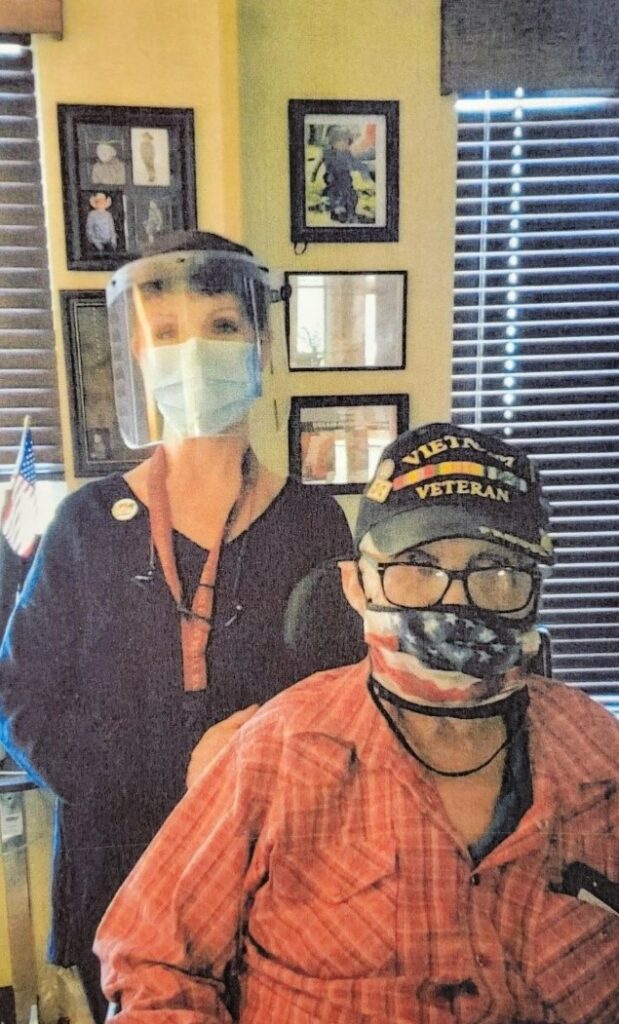
Karen Morrison
Branch of the Military?
U.S. Marine Corps
Rank?
E-4 Corporal
Where did you serve?
Camp Pendleton
When did you serve?
1983-1987
What did you do in the military?
By training, I was a jeep mechanic but I did not work in the capacity. I was the Platoon and Company Training NCO. I administered the PFT’s (Physical Fitness Test) and kept track of all education and training for all Marines in my company.
Why did you want to serve?
To be honest, I did not know what I wanted to be or do so I joined by default. I blame the movie, “An Officer and a Gentleman” for planting the idea. I originally tried to join the Navy but the recruiter was never in. The Marine recruiter saw me stopping in and gave me his best sales pitch; he had me at, “We’re the best”.
What does your service as a woman veteran mean to you?
I am very proud of my service now; I was not for many years due to negative events that occurred, but I have never regretted serving. I believe my time in the Marines made me who and what I am today.
What do you want other women veterans, or young women considering entering the military to know about your service?
Do not put up with harassment. Be vocal, speak up and stand up for your rights. It is an experience like no other.
How do you continue to serve?
I serve as a social worker at the Oregon Veterans Home in Lebanon. I make sure they receive what they need; both from the VA and basic necessities. I often advocate on the veteran’s behalf to ensure they obtain the services they have earned and deserve. My favorite part of the job is getting to hear their stories; I consider it a privilege to listen to their accomplishments.
What do you want veterans (and their families) to know about the programs and services offered by your organization?
The Oregon Veterans Home in Lebanon is an amazing place to be a part of; from the “Walk of Honor” to the Quilts of Valor and the medal ceremonies are all sacred to witness. The OVHL honors not just the veterans who live there but all those who work there as well.
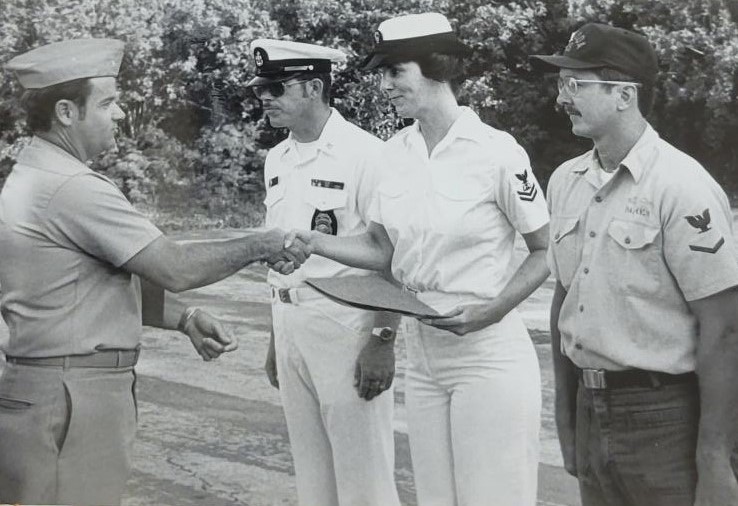
Jeri Payne
Branch of military?
U.S. Navy
Rank?
Petty Officer 2nd Class
Where did you serve?
Naval Surface Weapons Center Dahlgren, VA; Naval Air Station Bermuda
When did you serve?
1979-1984
Why did you want to serve?
I decided to serve my country because I had the unique opportunity to do something important that would make a difference.
What does your service as a woman veteran mean to you?
My service as a woman veteran means so much to me. I was in support services for deployed squadrons flying P3’s who were vigilant to watch for possible anti-submarine warfare missiles aimed at the U.S.
What do you want other women veterans, or younger women considering entering the military to know about your service?
I would like other women veterans to know that your sacrifices are deeply appreciated. Together we are stronger! To our younger sisters just starting out in service to our nation; serve with pride, be a role model, encourage those around you daily with a great attitude. Always remember the important contributions others have made for you.
How do you continue to serve?
Here at the Veterans’ Home, I strive to be an encouraging voice to others. I make our environment more cheerful with colorful, festive seasonal decor, I present ideas for outings and activities to recreation assistants, I do as a much as I am physically able every single day. I represent others here who are unable to speak for their needs and make these matters known to management at monthly resident council meetings, and I try to meet each day with a smile and friendly attitude.

Janine de Paz
Branch of military?
U.S. Army and Army Reserves
Rank?
Sergeant
Where did you serve?
I served in Nuremberg, Germany; Gulf War (Saudi Arabia, Iraq & Kuwait), Ft. Stewart, Georgia; and Bell, California.
When did you serve?
I served on active duty from Sept. 21, 1989, to Sept. 7, 1992, and Reserves from Sept. 7, 1992, to July 11, 1998. I was also in Delayed Entry from July 1989 to Sept. 20, 1989.
What did you do in the military?
My military occupational specialty (MOS) was an 88M20 Motor Transport Operator (Truck Driver). I was a personal driver for a USMC Colonel which included driving VIPs that visited. I drove tractor trailers hauling heavy equipment, supplies, weapons, ammunition and other things all over Germany with runs into Belgium and Denmark. During the Gulf War I hauled supplies, equipment, water and deceased soldiers but primarily EPWs from the frontlines to EPW camps. I also hauled supplies, fuel, water, equipment, weapons and ammunition in Georgia and California.
Why did you want to serve?
I originally signed up to pay for college but eventually I wanted to make it a career. This however did not work out due to my service connected disabilities, stress cards and being a single mom.
What does your service as a woman veteran mean to you?
I am proud of being a woman veteran but it was a struggle. I was in a primarily male dominated military occupation and had to prove myself to get the respect I deserved. I was able to earn the respect of my fellow soldiers and I actually prefer to work with men. In the Gulf War it was very difficult due to the Muslim culture. They did not want women soldiers driving; wanted us to cover our faces; and wanted us to cover our skin completely. I did not allow them to treat me differently. In Iraq a friend of mine and I were the only female soldiers for 100 miles which was difficult in a few ways. We had to hang up blankets to bathe with buckets. I am proud of my service and how I opened the doors for future generations.
One thing I remember that was frustrating was the media told the public that there were no women soldiers were in combat, on the front lines and that we didn’t even carry weapons. My family had no idea what it was really like and where I was.
What do you want other women veterans, or younger women considering entering the military to know about your service?
I would like anyone (not just women) considering joining the military to really understand what it means and know what they are getting into.
For women considering the military please understand that it is not easy. You have to constantly prove yourself and you have to be tougher or at least as tough as the men. Unfortunately, sexual harassment and military sexual trauma are still issues that women and men face in the military. It was a great experience and I am proud that I served. It was a struggle at times; a joy at times; horrible at times; amazing at times; and I would do it all over again.
My fellow women veterans I want you to know that you are not alone and you are amazing! I am proud to have served alongside so many fellow women veterans. Please remember that if you are struggling there is help out there. Keep your head held high and fight the good fight.
How do you continue to serve?
I continue to serve by being involved in service organizations and serving veterans in my careers. I am and have been an advocate for disabled and non-disabled Veterans. In my career I have assisted veterans with finding community, veteran and VA services that would assist them. I have counseled and assisted veterans in finding and obtaining employment. I am currently working at the Oregon Veterans’ Home in Lebanon as a Social Service Designee which means I am their advocate and resource.
What do you want veterans (and their families) to know about the programs or services offered by your organization?
I would like veterans and their families to know that the Oregon Veterans’ Home-Lebanon (OVHL) is a great place to live. We treat resident veterans with respect and honor. We provide a small home model of living and it is not like any other nursing home. You live in a facility containing four neighborhoods and two to three “houses” in each with 14 other Veterans/residents and have your own room with a bathroom. There is a common area and dining room where you can socialize but you can also have your privacy in your own room. There are many activities and outings available in the facility to keep you as active as you would like to be. There are gardens for Veterans to grow and maintain what they would like. In each neighborhood there is a Social Service Designee, an Activities Assistant, 1-2 Primary Care Providers and 1-2 Resident Care Managers. We provide or set-up transportation to medical appointments. We have on-site services that you may qualify for including dental, optometry, mental health counseling and nail care. The facility has a barber and beautician that is available to all residents free of charge. We have an active resident council as well as a family council.
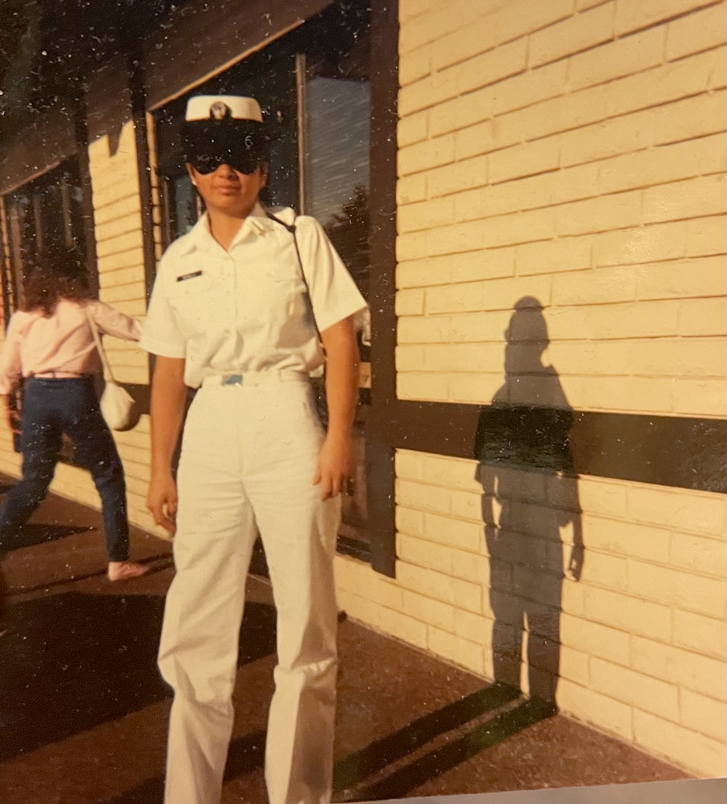
Dawn Coombs
Branch of military?
U.S. Navy
Rank?
E-4 MS3 (Mess Management Specialist 3rd class)
Where did you serve?
Bremerton, WA (Puget Sound Navy Yard)
When did you serve?
1986-1992
What did you do in the military?
Cook and run the barracks.
Why did you want to serve?
I saw it in the movies and my brother served.
What does your service as a woman veteran mean to
you?
Proud.
What do you want other women veterans, or younger women
considering entering the military to know about your service?
Go for it, it’s not as hard as they think.
How do you continue to serve?
I don’t go anywhere, but before COVID I represented Lebanon Veterans’ Home in the parade.
What do you want veterans (and their families) to know
about the programs or services offered by your organization?
Before COVID, veterans got represented in parades and wear belongings, hats, etc from their service time.

Jennifer Antle
Branch of military?
U. S. Marine Corps
Rank?
Sergeant/E-5
Where did you serve?
MCRD San Diego and 1st MAW, Camp Foster, Okinawa Japan
When did you serve?
August 1994 to September 2000
What did you do in the military?
Administration and sponsorship coordinator
Why did you want to serve?
I wasn’t ready for college; so I thought the military would be a great stepping stone for me, while I figured out my future, and to serve my country while figuring things out seemed like a great thing to do. I started looking at Air Force and Navy; and essentially joined the Marine Corps on a dare; my high school counselor said to me when I told him I was looking at the military that we hadn’t had a girl graduate our high school in over ten or twelve years and join the Marine Corps. So I did. I had to be the one in how long to do it. I had to accept that challenge. I shocked everyone I knew when I enlisted.
What does your service as a woman veteran mean to you?
Both of my grandfathers were drafted into the Korean war; and were very proud of their service. I am extremely proud of doing something that most of family didn’t. I don’t focus on “woman veteran” that much; because my son is a Marine and his service is just as important to me. My service gave me a career; I took the skills I learned in the Corps, my GI Bill and got my paralegal degree; I met my husband who retired from the Marines in 2010; and I just handed them (the Marines) my son in 2019.
What do you want other women veterans, or younger women considering entering the military to know about your service?
It was a great experience. It’s like so many things; you get out of it what you put into it. I loved it; I embraced it; boot camp really sucked; but the honor of becoming a Marine was amazing. Knowing that I will always hold that title; and know that it helped to shape the rest of my life – it was the best thing I ever did.
How do you continue to serve?
I recently accepted the position of Lake County Veterans Service Officer when our long time VSO retired. When we moved here in 2013 and worked with him ourselves for our own claims, I had told my husband that if he ever retired; that’s my dream job! I was at my prior job for nearly 8 hears and ready for a change and it happened at the right time! I am able to use my legal background as well as my experiences as a veteran and my passion to help other veterans and their families daily.
What do you want veterans (and their families) to know about the programs or services offered by your organization?
Veterans Service Officer is available to assist with a multitude of issues that veterans or their families could face; navigating the VA claims, disabilities, benefits, pensions, etc. can be daunting. My job is to help unravel that and make it easier for the veteran and their families. Our office can possibly assist with obtaining personnel records, DD214s’ burial benefits questions, discharge upgrade questions; among so many other issues.
To connect with the Lake County Veteran Service Office, click here.

Ellen Harshbarger
Branch of military?
U.S. Army
Rank?
Private 2nd Class
Where did you serve?
Fort Monroe, Virginia
When did you serve?
1972-1973
What did you do in
the military?
Public Affairs information soldier
Why did you want to
serve?
I wanted to do something different
What do you want
other women veterans, or younger women considering entering the military to
know about your service?
That joining the military was a real eye opener. Before joining, I didn’t have an appreciation for all that being in the military entails.
How do you continue
to serve?
I continue to serve by advocating for the veteran residents at the Oregon Veterans Home- The Dalles, serving as the Resident Council President for almost a decade, and currently serving as the Resident Council Vice President.
What do you want
veterans (and their families) to know about the programs or services offered by
your organization?
I’d like veterans and their families to know that Oregon Veteran Homes provide excellent care.

Caroline Karaverdian
Branch of military?
I served in the Air Force HUUUUUUUUUH!!!
Rank?
I separated as an E-4 Senior Airmen.
Where did you serve?
I served my entire enlistment at Beale AFB, CA
When did you serve?
I served 2018 to 2021
What did you do in the military?
I was a 4A0. That’s a medical records technician. We are in charge of all the medical clinics and odd-jobs combined into one career field. Due to under manning I was kept at my position to help mentor the new airmen as there was one other sergeant.
Why did you want to serve?
I wanted to gain some life experience that I felt I couldn’t do if I had remained in Utah. Additionally, for school benefits and healthcare. I wanted to prove to myself that I could achieve anything I put my mind towards.
What does your service as a woman veteran mean to you?
I think it reiterates to me what I already knew about women as a whole. We can do and accomplish the same as our brothers in arms. Proves what we knew all along, that we are equal.
What do you want other women veterans, or younger women considering entering the military to know about your service?
How important having a support system is. Whether you stay at the same base for your whole enlistment or move around for the majority of it, to make sure you have family everywhere you go.
How do you continue to serve?
Then, I was serving on a grander scale now I serve my local community. Local active duty and veterans.
What do you want veterans (and their families) to know about the programs or services offered by your organization?
That the public law changes all the time. What was not seen as serviced-connected then, might be now.
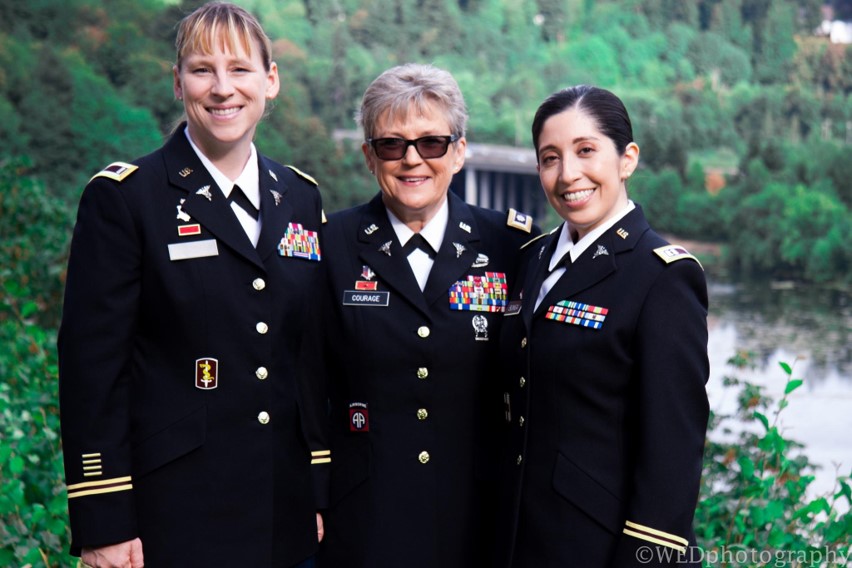
Sarah Súñiga
Branch of military?
US Army Reserve
Rank?
O-3 CAPTAIN
Where did you serve?
My reserve unit was based out of JBLM and I also deployed to Afghanistan
When did you serve?
2011-2018
What did you do in the military?
I was a behavioral health officer serving in a Combat & Operational Stress Control (COSC) medical detachment. The COSC mission is to provide behavioral health services during combat operations as far forward as possible in order to keep service members in the fight and keep units operational. On deployment, I ran a behavioral health clinic and when I wasn’t there, I was traveling to go directly to teams and units requesting support.
Why did you want to serve?
I come from a family lineage of public service with generations of service members, civil servants, teachers and nurses. I hear the call to serve my community daily. I focused my clinical psychology training to become a trauma therapist, which led me to the VA. When I learned a COSC unit was actively looking for a trauma therapist and preparing for deployment, I knew it was my opportunity to use the skills I had honed. As the acceptance of behavioral health support within the military has grown, I felt I had something to contribute. In thinking about all of my friends and family who served, I wondered how their experiences would have been impacted if behavioral health support they could trust was available. Stepping up to serve was the chance to do my part to mitigate the impact of operational and traumatic stress in real time.
What does your service as a woman veteran mean to you?
My service in the US Army expanded my understanding of myself and my capacity to do anything. I was fortunate to be surrounded by strong women leaders. All of my commanders were women! Most of the senior enlisted I worked with were women. I learned that if I am part of a team that believes in me and I believe in them, we can get through anything together.
How do you continue to serve?
I serve the military and Veteran community at the VA Portland Healthcare System (VAPORHCS). I am in the role of the Women Veterans Program Manager (WVPM). Every VA HCS has a WVPM. We provide expertise in the area of Women’s Health to the VA workforce and we help women veterans connect to VA healthcare services.
What do you want veterans (and their families) to know about the programs or services offered by your organization?
VA is committed to honoring and respecting women Veterans. VA wants women to have access to resources they need and can trust. The women Veteran population is growing and is a diverse group that includes Black, Indigenous, People of Color (BIPOC) and LGBTQ+ communities. The Women’s Health program partners with the LGBTQ+ Veteran Care Coordinators, Military Sexual Trauma (MST) Coordinators, Patient Advocates and others to support trauma-informed healthcare in a sensitive and respectful environment. Resources for women Veterans offered through VA include comprehensive women’s health care to serve women Veterans unique health care needs across the lifespan. Women’s Health Primary Care Providers and their teams take care of general medical needs and gender-specific care and can refer to specialty services. VA also provides robust mental health services, including reproductive mental health services. In fact, we provide support to Veterans from preconception through the postpartum period and menopause.
I want to also highlight services folks may not be aware of that we provide here at VA Portland HCS. We are proud to provide lactation support for pregnant Veterans with a clinical nutritionist. We provide other kinds of nutrition support as well through the Healthy Teaching Kitchen program. In fact, we have a cook-along group for women veterans starting in April. Many folks are not aware of VA’s Whole Health program, which promotes an approach that goes beyond illness or injury and focuses on values, goals, and overall health. Whole Health provides complementary therapies to supplement medical care. At VA Portland HCS, this includes acupuncture, meditation, and trauma-sensitive yoga.
The VA Whole Health program also includes The Mindfulness Institute offering a variety of options such as mindfulness-based groups and online tools.
I also want Veterans to know about the “She Wears the Boots” podcast. The Veterans Health Administration (VHA) Women’s Health program developed this podcast and it highlights healthcare services available through VA. They invited healthcare leaders within VA to provide information from topics ranging from heart health, menopause hormone therapy, musculoskeletal health in women, and more. I want to spread the word about the podcast because you can listen to it as your schedule allows and it offers another alternative to reading information from a webpage or brochure. I want Veterans to know about the Women Veterans Call Center. All calls are answered by women and they can be a guide to VA. It is a free and confidential service available to any woman Veteran or anyone calling for a woman Veteran they know. You can call or text 1-855-VA-WOMEN. If, for example, you want to find the WVPM or Women’s Health program closest to you, the WVCC can help you! I’m wishing all Veterans in Oregon well and I join you all in celebrating Women’s Military History week. Thank you, ODVA, for this opportunity to share information about what VA has to offer and for the opportunity to share a few of my military experiences!
For more information about VA women veterans health care services, click here.
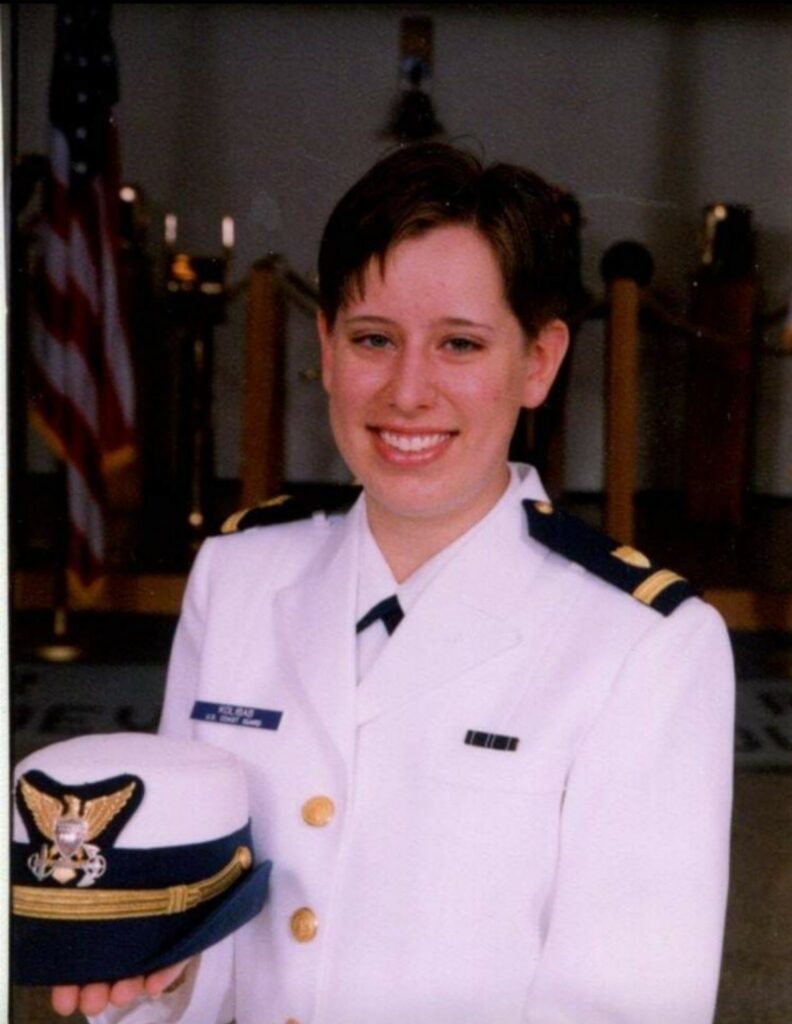
Kim Douthit
Branch of military?
U.S. Coast Guard
Rank?
1LT / O2
Where did you serve?
San Diego
When did you serve?
2001 – 2004
What did you do in the military?
I started out as the Weapons Officer for an armory that supplied an air station and a number of cutters that were ported in San Diego. That was a pretty good intro to personnel management as well as property custodianship! I later held the role of Coast Guard Auxiliary Coordinator which I enjoyed. The USCG Auxiliary is a volunteer force so as a young officer I got some good experience managing both regular, paid staff and volunteers.
Why did you want to serve?
I grew up in a small, working class town where few people went (and still don’t go) to college, particularly women. I was a first-generation college student and it was a big deal when I graduated. I really wanted both meaningful work and a way to get far away from where I grew up. During my senior year in college I saw a magazine ad for the Coast Guard in a women’s magazine. At the time, the Coast Guard was looking to increase the number of women in its ranks and their campaign hooked me. I called a recruiter, much to the alarm of my mother, and ended up an officer candidate a few months after graduating.
What does your service as a woman veteran mean to you?
At the time I was serving I didn’t think much of it but after leaving service I realized that it was kind of a big deal – military service in general is important and helps many of us find purpose but serving as a woman helps continue the groundbreaking work from generations of women before we came along. Like other women who dare to challenge gender norms in professional roles traditionally held by men, women veterans have helped increase the visibility of women in leadership positions and diverse career fields.
How do you continue to serve?
I really enjoy working in public service. I like being able to continue to give back to my local community. I’m especially fortunate to work for ODVA, a veteran-focused agency, and oversee programs that are designed to help vets access education and training that’s helping many of them take the first steps toward their post-military careers.
What do you want veterans (and their families) to know about the programs or services offered by your organization?
The State Approving Agency (SAA) is contracted by the VA to be the local point of contact for schools and employers in Oregon who are currently administering GI Bill® benefits and those who would like to be approved as a VA facility. The SAA staff can answer questions from school staff and employers regarding the approval process and can also talk with beneficiaries about how to find an approved facility so they can get enrolled in an eligible program to begin receiving benefit payments. Our Campus Veteran Coordinator works with Veteran Resource Center staff on campuses to help create a supportive community for the professionals doing the work of helping campus veterans progress in their educational goals. The Veterans Educational Bridge Grant (VEBG) is available to veterans in degree or training programs whose progression is interrupted due to unavailability of classes or on the job training hours.
To learn more about benefits, visiting the VA’s Education and Training home page is a great first stop to read about the different benefits and recent news plus navigate to links to apply for benefits, etc.
If a veteran or family member is looking for information on which schools and employers are approved to administer GI Bill® benefits, the GI Bill® Comparison Tool is a terrific resource. The Comparison Tool has information on all approved facilities in every state and includes a benefit calculator so a beneficiary can estimate their benefit payments plus it lists the facility’s website and the VA point of contact.
We never want to miss an opportunity to share information on the Veterans Educational Bridge Grant! If a veteran finds themselves unable to register for school because their classes are not available for the upcoming term, effectively delaying their graduation OR if they’re in an apprenticeship or OJT program and are unable to access OJT hours which delays their training progress this grant may be available to help sustain their household until their classes or training hours resume. The Bridge Grant makes awards of up to $5,000 available to veterans who meet eligibility criteria and submit a completed application.
To access the application, submission instructions, and contact information for the Veterans Educational Bridge Grant Program, click here.
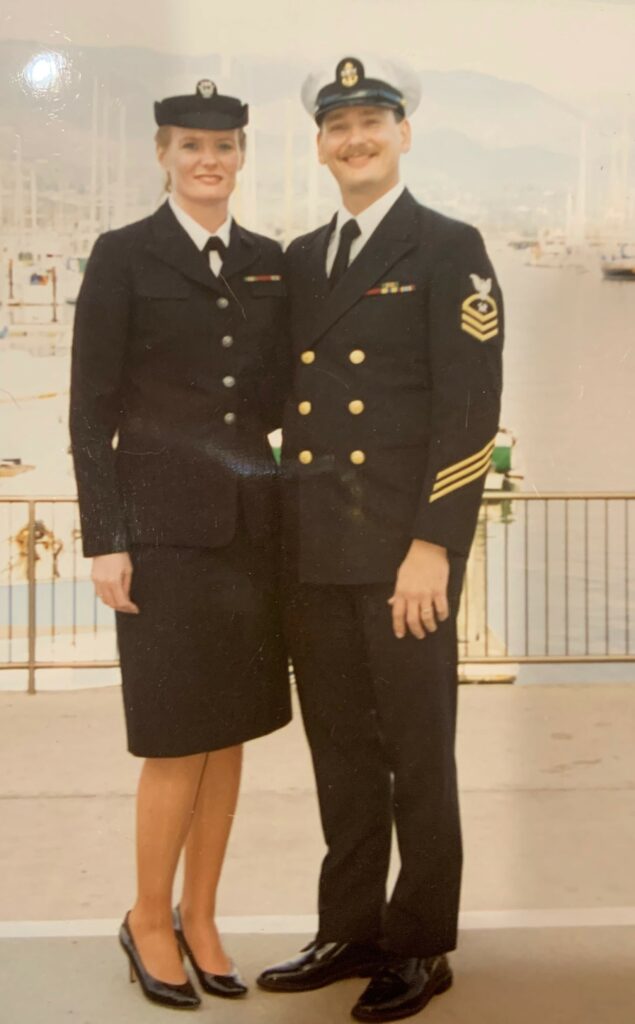
Mary Ann Schelb
Branch of the military?
U.S. Navy
Rank?
EM3 Electrician’s Mate, Third Class Petty Officer
When do you serve?
July 1983 – July 1987
Where did you serve?
I served on two ships: USS Puget Sound AD-38 from July 1984-Dec 1986 and USS Jason AR-8 from Dec 1986-July 1987.
What did you do in the military?
My first ship was a destroyer tender home-ported in Gaeta, Italy with the sixth fleet Admiral on board. We hit the best ports: Spain, France, Israel, and Sicily. We changed home-ports, and I sailed across the Atlantic to Norfolk, VA. I worked in the rewind shop where I pulled motors, changed bearings, and assisted with rewinding.
After returning to the states, I requested and was granted a “swap” and traded duty stations with another EM3. She came to Virginia to serve aboard the USS Puget Sound, and I took her place on the USS Jason, home-ported in Pearl Harbor, Hawaii. Once again I was fortunate enough to serve on board when we changed home-port and crossed the Pacific to San Diego, CA. I worked in the electrical shop and did more troubleshooting all over the ship. We stood switchboard watch, hooked up shore power, and when I left I was in charge of the tool issue program.
What does your service as a woman veteran mean to you?
Growing up in a military family made the choice of enlisting easy for me. My father served in the US Army in Lyon, France during WWII, and five of my six brothers joined the service directly after high school (four in the Navy, one in the Marines).
The four short years I served in the US Navy continue to define me as a woman. Confidence and pride carry to the present day, and friends still show respect for my military experience; being a veteran is simply a part of my identity. I encourage women to serve and to take advantage of all that is offered in way of education and experience. Opportunities continue for the veteran even decades after enlistment including all types of classes. I participate in physical education classes, practice mindfulness, and benefit from behavioral therapy, all through the veterans program.
How do you continue to serve?
As impressive and impactful as the aforementioned programs are, the Veteran Readiness and Employment (VRE) program is potentially the most impactful program in my life. I am presently awaiting acceptance in to a Master’s of Social Work college. The courage to apply came from the knowledge that the VA has my back. I have a personal (VRE) counselor, Larissa Forseth, who checks in with me to make sure I meet deadlines, am able to complete tasks as needed, and assures me there will be financial assistance when I am accepted. It is a life changer. I am continuing to chase my dreams.
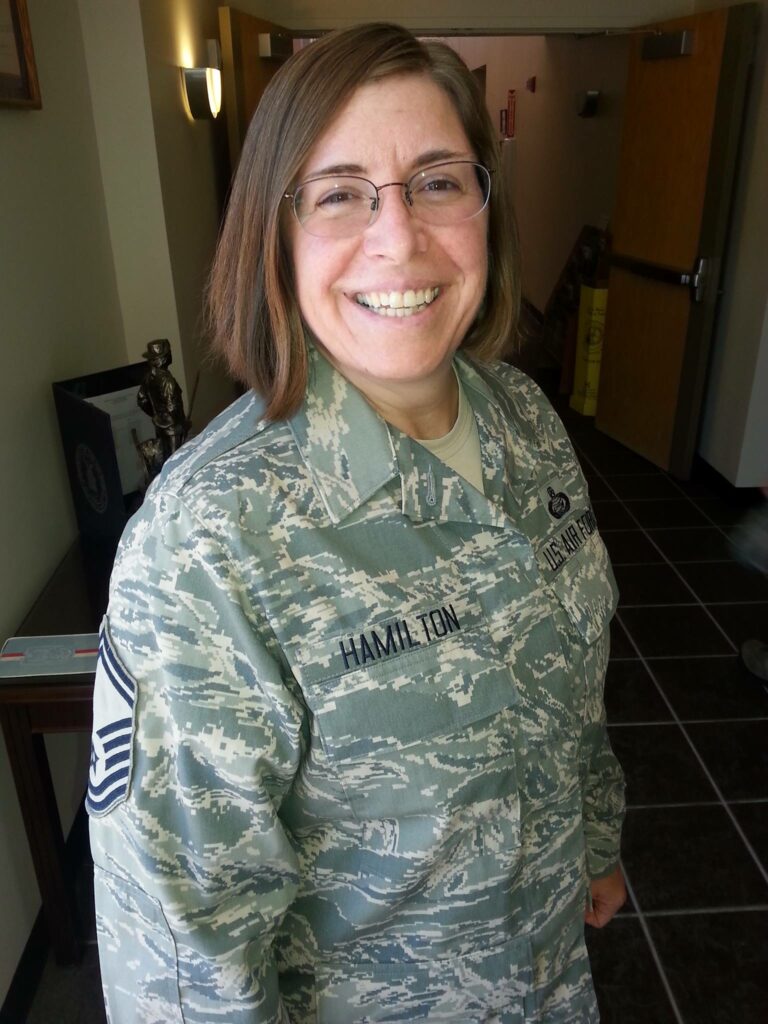
Virginia Watson
Branch of military?
U.S. Army, U.S. Army Reserves, Oregon Army National Guard, Oregon Air National Guard, U.S. Air Force
Rank?
I started as an E-1/PVT with the U.S. Army and ended with E-8//SMSgt with the U.S. Air Force, 15 yrs Army, 17 years Air Force
Where did you serve?
I served in Germany, Afghanistan, Oregon, Colorado, California, Idaho, Utah, Texas, Washington state, Arizona, Alabama, Georgia, Mississippi, Florida, South Carolina, Virginia, and New Jersey
When did you serve?
June 1984 to April 2016 (32 years)
What did you do in the military?
Force Development Superintendent, Personnel Systems Manager, Workgroup Manager, Logistician, Human Resource Superintendent, Jet Airman, Client Support NCOIC, Readiness NCOIC, Base Education & Training Manager, Team Lead, Combat Telecommunications Operator, Army Drill Instructor, Army Admin NCO
Why did you want to serve?
From a young age I remember hearing stories of my grandfather’s family and their struggles before coming to America and didn’t want to take the freedoms we have here for granted. He told me that when his parents came to America, they no longer wanted to talk about where they came from or even speak that language anymore. They wanted to be identified as American and speak English. I chose to serve in the U.S. Military because I strongly support our United States Constitution and the freedoms it secures for us and would do anything to protect it and our citizens. The military’s code of ethics aligned with mine and provided an avenue to set my values into action. It was such a good fit that I stuck with it for 32 years.
What does your service as a woman veteran mean to you?
My military service meant I could learn to do any job that the military needed and do it as good if not better than any of my counterparts and we all could do our jobs even better when we worked together. At the beginning of my service, there was still a lot of disparity between the genders in the military. I started as an E1 when I graduated from High School, unlike my counterparts that would start as an E3 just for being a male High School graduate. I went from E1 to E5 in just 2yrs 9mos. I was regularly told, during those early years, that I needed to be thankful that the military even let me in as a female. I think the hardest moment in my career was when, as an E6, my husband I were pregnant with our first child and because I “no longer presented the uniform in a professional manner,” I was demoted to E5 and placed in an admin position. Yet not even a year later, after my son was born, I made arrangements for my son to be cared for by my parents as both my husband and I were being activated for Desert Storm. Those 32yrs of service definitely had its ups and downs. I can tell you I have seen some tremendous breakthroughs toward equality for females during that time. To include uniforms designed more to their needs, even for maternity. I do still feel there are many more changes that need to happen for females to feel safe while serving, but the future looks brighter. I would still like to see more attention brought to the need for acknowledgement of the harassment and assaults of many of those females that served in those early years. There should be no time limit for these cases to be heard and/or prosecuted. I was a witness to and a victim of assault while in and there is still a great deal of disconnect on how to get the help and care needed while serving. I could expound greatly on this, but not here. I would have done more if I had been allowed to stay in longer, but that’s why this new generation of military females need to stand strong and advocate for more changes and better processes.
What do you want other women veterans, or younger women considering entering the military to know about your service?
I want other women veterans (like my daughter) and younger women that are considering entering the military to know that they will be joining during the best time in the history of the military to accomplish even more than I was able to. The military provided me so many job and leadership opportunities in a very diverse work environment. That, I am very proud of. Today’s military will provide them equal, if not better opportunities to have a successful and rewarding career. Their story is either just beginning, playing itself out, or ready to begin. But it will be their story from beginning to end. I only hope that they will continue to be the ones standing in opposition to any bias that they encounter and on the front lines advocating for even more changes to come. And, when they reach the end of their military service, that they can look back with pride in what they’ve accomplished both personally and professionally for those around them.
How do you continue to serve?
I continue to serve by using the skills the military has provided daily and am currently pursuing a bachelor’s degree in Cybersecurity for a future career. I also like to help veteran’s that are transitioning from military to civilian life by offering to help with any computer automation they might need, especially with resumes and online job applications or searches. There are many jobs in the military that don’t require computer skills and this can be a huge learning curve to overcome when looking for a job once they get out.
What do you want veterans (and their families) to know about the programs or services offered by your organization?
I would like veterans and their families to know that there are some great programs out there for veterans, whether your still in, transitioning out, or already out. I am a 100% service-connected disabled veteran that went through the compensation and pension process with very few problems due to improvements to their processes and a great care manager named Chris Petrone. Even the Veteran Readiness & Employment Services (used to be called VocRehab) has gone through some major changes that have provided the opportunity to pursue my bachelor’s degree in Cybersecurity, to which I am within a year of completing. My advice is that even if you tried to receive some benefit that you earned in the past and were denied, try again. The programs have had significant enough changes to merit a second look to see if you qualify.
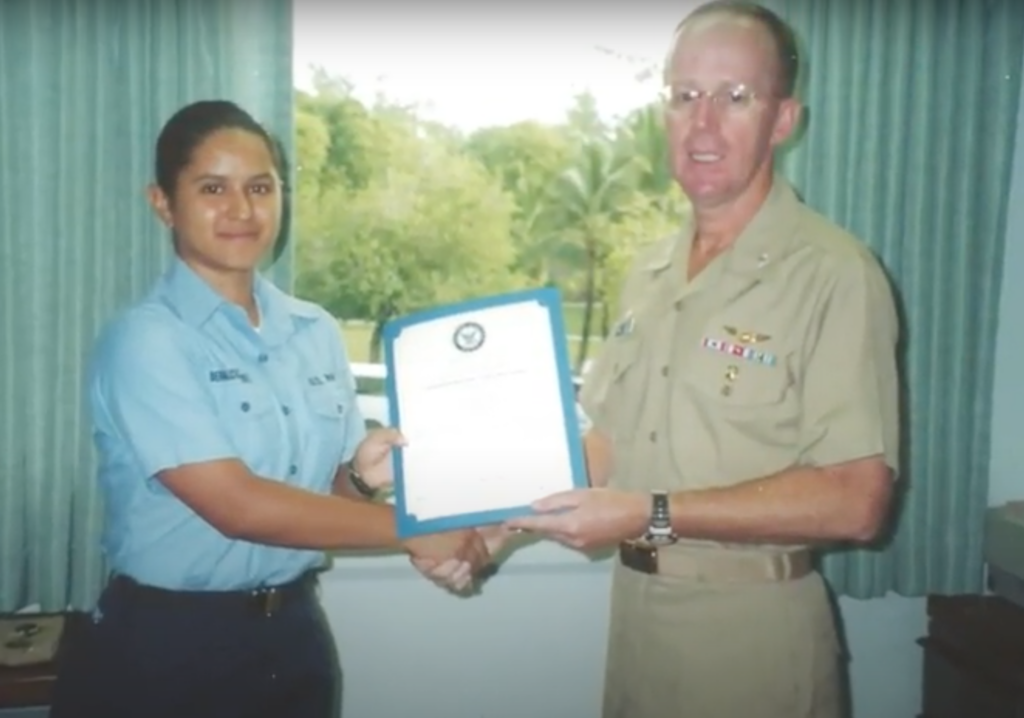
Jomayra Bermudez Otero
Branch of military?
U.S. Navy
Rank?
AO3
Where did you serve?
NSF Diego Garcia, and VP-46 at Whidbey Island, WA
When did you serve?
April 2002 to September 2005
What did you do in the military?
I was an Aviation Ordnanceman, which means I got to move, store, build, and load aircraft weapons.
Why did you want to serve?
I wanted to gain independence in my life. Coming from poor conditions, my parents couldn’t afford for me to leave Puerto Rico to find a better life, so I did it myself by joining the Navy.
What does your service as a woman veteran mean to you?
It means I am capable, both to be an independent person and to thrive in a field that, at the time, was ruled by men.
What do you want other women veterans, or younger women considering entering the military to know about your service?
I want them to know that it was not easy. Fight for yourself. Reach out to people outside the chain of command if you have to. Most importantly, in spite of what happened to me, joining the Navy was the best decision I ever made, as it led to the life I now have. It led to experiences I couldn’t have gained otherwise. I’ve been to Spain, Greece, Italy, Japan, and Singapore to name some places I’ve gotten to visit. It was one of the best experiences of my life, and I have no regrets.
How do you continue to serve?
I work for a non-profit hospital system that focuses on doing right by its patients, and puts their wellbeing over profits. I also make charitable contributions to St. Jude’s Children Hospitals and participate in fundraising events that help children hospitals. Even though I’m no longer in the military, I help my community however I can.
What do you want veterans (and their families) to know about the programs or services offered by your organization?
VR&E has helped me return to school to gain the knowledge I needed to compliment my previous degree and be able to finally move away from a job where I was under constant verbal abuse, triggering my PTSD. Thanks to this program, I now have a job where I get to help people in a healthy work environment.
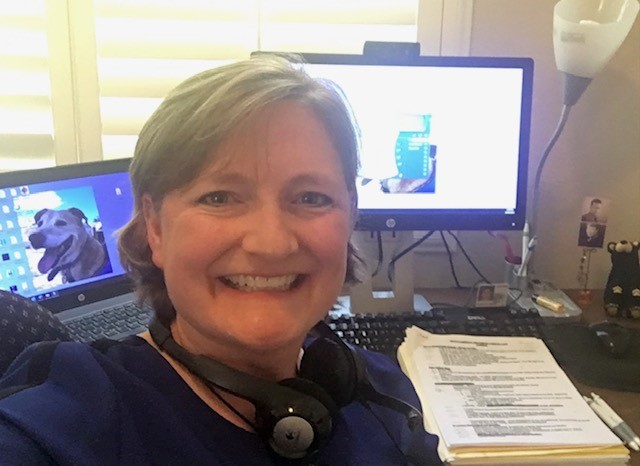
Larissa Forseth
Branch of the military?
Navy (NCIS)
Where did you serve?
I was stationed in Bremerton, WA; Hanover, MD; and Pearl Harbor, HI. I deployed to Kuwait in 2003 in support of the III Marine Expeditionary Force and deployed to Camp Phoenix, Kabul, Afghanistan, in 2006 in support of the Strategic Counterintelligence Directorate.
What did you do in the military?
Prior to working as a vocational rehabilitation counselor (VRC) for the Department of Veterans Affairs Chapter 31 Veteran Readiness and Employment (VR&E), I worked as a Special Agent and Polygraph Examiner for the Naval Criminal Investigative Service (NCIS).
In support of the Navy and Marine Corps stateside, I investigated sexual assault crimes and crimes against children, provided foreign counterintelligence support and research technology protection, and worked as a polygraph examiner and interrogator. Through my work with active duty members stateside, I discovered women are incredible interrogators and are extremely conscientious protectors of classified materials and information. While deployed, I met and worked with women every branch of the military in support of operations in-country and witnessed on a daily basis their courage and sacrifice in volunteering to serve their nation. The women service members I encountered on deployment were not only strong, resilient, capable, and effective team members; they also demonstrated compassion and emotional intelligence in fostering communication and relationships of trust with the men, women, and children of Iraq and Afghanistan.
Why did you want to serve?
My grandfather (USA) served in World War II, my father (USN) in Vietnam, and my brother (82nd Airborne, USA) in Operation Iraqi Freedom. I am extremely proud to have worked alongside and in support of the military given the military history of my family and my own positive experiences with the military; and it is a privilege to continue serving women veterans on a daily basis. With their ambition, intelligence, world experience, attention to detail, and excellent collaboration and sound decision-making skills, women veterans are a tremendous asset in the civilian workforce.
What do you want veterans (and their families) to know about the programs or services offered by your organization?
The goal of VR&E is to assist veterans with service-connected disabilities in overcoming barriers to employment and obtaining and maintaining employment that is compatible with their interests, aptitudes and abilities. In addition to providing training if required for a veteran to attain a suitable goal, our program offers counseling and guidance, case management, referrals to medical and other resources, and employment services. If you are a veteran with a service-connected disability rating and are interested in learning more about our services or how to apply, please refer to the VA website. Thank you for your service, and we look forward to meeting you.
Lacey Carter
What do you want veterans (and their families) to know about the programs or services offered by your organization?
“Let the generations know that women in uniform also guaranteed their freedom. That our resolve was just as great as the brave men who stood among us. And with victory our hearts were just as full and beat just as fast — that the tears fell just as hard for those we left behind.”
— World War II Army Nurse, Oregon I Am Not Invisible Exhibit
Aging Veteran Services Division
www.oregon.gov/odva/agency-programs/avs/Pages/default.aspx
The Aging Veteran Services Division is a program within the Oregon Department of Veterans’ Affairs that was established to address the needs and concerns of our rapidly aging veteran demographic and their families. The Aging Veteran Services Division of the Oregon Department of Veterans’ Affairs program works to ensure aging veterans and their families receive support and services at the local, state and federal levels. Currently, the division incorporates the operational management of:
Oregon Veterans’ Homes (In The Dalles and Lebanon);
https://www.oregon.gov/odva/Vets-Homes/Pages/default.aspx
- Care at the Oregon Veterans’ Homes is an earned benefit available to veterans, their spouses, and parents who had a child die while serving in the U.S. Armed Forces.
- To be eligible for this benefit, qualifying veterans must have served as defined by the U.S. Department of Veterans Affairs (Federal VA) and received an honorable discharge from their branch of service. A physician’s recommendation that skilled nursing care is needed is required in order to be admitted into either Veterans’ Home.
Conservatorship Program
www.oregon.gov/odva/Benefits/Pages/Long-Term-Care.aspx
- The Oregon Department of Veterans’ Affairs Conservatorship Program serves veterans and their surviving spouses, their immediate family members, minor children and helpless adult children of veterans, and dependents’ parents.
- A conservator administers the financial estate of a protected person according to provisions of Oregon Revised Statutes, Title 13, Chapter 125. A conservator gains possession of all income and assets and establishes a personal budget and pays for care, personal needs, dependent support, property maintenance, etc., according to that budget.
- A conservator applies for all benefits for which the protected person may be eligible and invests or otherwise conserves unused funds. An accounting of financial activities is submitted to the court, USDVA, protected persons and others as required by law.
- ODVA’s trust officers are experts in USDVA law and regulation, and work closely with interested family members when planning for the welfare and best interest of the veteran, their spouse or dependent.
Representative-Payee Program
www.oregon.gov/odva/Benefits/Pages/Long-Term-Care.aspx
- The Oregon Department of Veterans’ Affairs also offers Representative Payee Services for veteran clients and their dependents. As a representative payee, ODVA acts in a limited capacity to pay bills on behalf of their clients.
- Representative Payee Services assists beneficiaries in need of help with money management to ensure their income is used for their personal care and well-being. The goal is to help veterans live productive lives. This usually involves paying for their housing, care and utilities and providing allowances for food, transportation, clothing, medications and other expenses.
Veteran Volunteer Program
- The goal of this program is to have a statewide network of volunteers trained to locate veterans and their families, assist them in recognizing potential earned benefits and services, and connect them to individuals and organizations for additional assistance.
- This program provides training and oversight on an ongoing basis to volunteers, ensuring that volunteers are supported in assisting these Oregonians to the resources who can best advise them regarding their benefits.
- Lastly, this program will continue to explore and identify additional opportunities to assist veterans and/or their families.
Aging Veteran Outreach
www.oregon.gov/odva/Resources/Pages/Aging-Veterans.aspx
The Aging Veteran Outreach Specialist
- Works collaboratively with agency partners statewide to connect aging veterans with necessary benefits and resources essential for safe and healthy living
- Educates local, state and private organizations on aging veteran needs, issues and available resources
- Advocates on behalf of aging veterans to live as independently as possible with dignity and respect
There are numerous local, state and federal benefits and resources available for aging veterans and their dependents. The average veteran cannot be expected to know of all of the benefits and resources available to them or understand all of the laws governing those benefits. Benefits and resources change or are added often so it is important to continue to stay connected to an advocate. There is free help available from trained advocates in your local area to assist you with obtaining benefits and resources.
Resources and Services
Elderly [Aging] Veterans – USDVA
Includes Links to Information About Veterans’ Benefits and the VHA Geriatrics Program including Long Term Care, Eligibility for Long Term Care, Home Based and Community Services, Nursing Home and Residential Care, and Geriatrics Research
www.benefits.va.gov/persona/veteran-elderly.asp
World War II Veterans – USDVA
www.benefits.va.gov/persona/veteran-world_war_II.asp
World War II Veterans Health Issues
www.va.gov/health-care/health-needs-conditions/health-issues-related-to-service-era/world-war-ii
Korean War Veterans – USDVA
www.benefits.va.gov/persona/veteran-korea.asp
Vietnam War Veterans – USDVA
Vietnam War Veterans Health Issues
www.va.gov/health-care/health-needs-conditions/health-issues-related-to-service-era/vietnam-war
Blue Water Navy Vietnam Veterans Act of 2019 – USDVA
benefits.va.gov/benefits/blue-water-navy.asp
Agent Orange Exposure and VA Disability Compensation – USDVA
www.va.gov/disability/eligibility/hazardous-materials-exposure/agent-orange/related-diseases
Services and Resources for Seniors and People with Physical Disabilities – State of Oregon
Seniors and People with Physical Disabilities – Oregon DHS
www.oregon.gov/dhs/SENIORS-DISABILITIES/SPPD/Pages/index.aspx
Oregon Aging and Disability Resource Connection Information
www.adrcoforegon.org/consumersite/index.php
Oregon Office of Long-Term Care Ombudsman
www.oltco.org/oltco/index.html
Oregon Veterans’ Homes
www.oregon.gov/odva/Vets-Homes/Pages/default.aspx
Protecting Aging Veterans and Their Families
Fiduciary Programs – ODVA
www.oregon.gov/odva/benefits/pages/long-term-care.aspx
Fiduciary Program – USDVA
www.benefits.va.gov/fiduciary/
Guardianship and Conservatorship – State of Oregon Judicial Department
www.courts.oregon.gov/programs/family/guardianship-conservatorship/Pages/default.aspx
Scams Targeting Veterans
www.aarp.org/money/scams-fraud/info-2019/veterans.html
Oregon Department of Justice Spotlight: Elder Abuse
You Are Not Alone
Make the Connection – Retirement and Aging
www.maketheconnection.net/events/retirement-aging
VA Crisis Line
Senior Loneliness Line – Oregon
seniorlonelinessline.org/about-us
Stories of Aging Women Veterans’ Service
Women Veterans Bravely Served During Vietnam War
blogs.va.gov/VAntage/86001/women-veterans-bravely-served-vietnam-war
AARP Women Veterans Talk About Their Military Experiences
www.aarp.org/home-family/voices/veterans/info-2020/women-veterans-day.html
My grandmother, Sylvia Benton, and the 6888th Central Postal Directory Battalion
U.S. Army Center of Military History – 6888th Central Postal Directory Battalion (Women’s Army Corps)
history.army.mil/html/topics/afam/6888thPBn/index.html
National Archives “Hello Girls” – Women Telephone Operators during WWI
unwritten-record.blogs.archives.gov/2021/03/30/hello-girls-women-telephone-operators-during-wwi
Need Help? Have Questions? Don’t Know Where to Start?
If you have questions, need additional information about benefits, resources or services for aging veterans and their families, or just don’t know where to start, connect with a trained Oregon Department of Veterans’ Affairs Veteran Volunteer at 1-833-604-0885 or www.oregonvetvolunteer.com.
Views: 863
